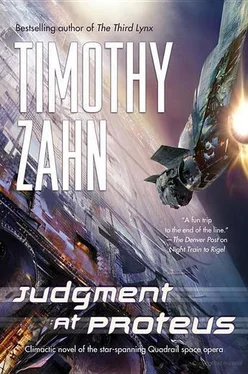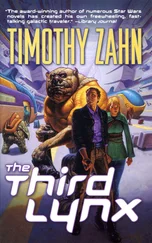Not that the Shonkla-raa were likely to be coming in after us. Not now. The Shonkla-raa I’d stabbed was lying across the drudge’s legs, his bloodied arm still hanging limply through the opening. He was dead, or close enough. So presumably were the rest of his colleagues.
So was Losutu.
We were huddled together on the floor, one of us dead, the rest of us barely alive, pressed close around the second to last of the airlock’s oxygen tanks, when the Spiders finally came for us.
“I understand,” Morse said quietly from beside me, “that the whole thing’s being filed under the heading of a tragic accident.”
I nodded silently as I gazed across the station at the rows of bodies, and the grim-faced soldiers and medics from the transfer station carrying the stretchers to the shuttle hatchways.
Two hundred and fifty-six dead. Five survivors, aside from McMicking, Hardin, and me, all of them in critical condition. The Quadrail schedule crashed, with ever-growing disruptive ripples flowing out across the galaxy in both transportation and the critical area of interstellar messages and communication.
An accident.
“What about the passengers on the train?” I asked. “Are they saying anything?”
“Nothing of interest,” Morse said. “Bayta was able to get all the display windows opaqued before anyone saw anything.”
I nodded. “Small favors.”
He nodded back. “Bloody small.”
For another minute we stood in silence, watching the grisly cleanup duty. The Shonkla-raa bodies, not surprisingly, had all been spirited away by the Spiders before emergency teams had even been called. Under other circumstances, I reflected, such subterfuge would have been futile, given how many witnesses had seen them.
In this case, most of those witnesses were already dead, and the rest of us weren’t talking.
“Is Bayta still with Losutu?” I asked.
“Yes, I think so,” Morse said. “The others are down the hall, keeping Hardin company while the Cohn aerator cleans out his lungs. Looks like most of the damage is repairable.”
“Good to hear,” I said. I didn’t have any particular affection for the man, but we’d lost enough people for one day.
“Yes,” Morse said. He hesitated. “McMicking is also telling him everything about the Shonkla-raa.”
I grimaced. But there was no way we were going to hide this one under the rug. Not from Hardin. “I trust he made it clear that Hardin needs to keep all this secret?”
“Very clear,” Morse said. “Under pain of death, actually.”
“Which probably doesn’t mean much to Hardin.”
“Coming from McMicking?” Morse smiled tightly. “More than you might think.” He nodded toward the medical center. “Go on over, if you’d like. I can handle any last-minute questions Colonel Savali might have.”
“Thanks,” I said. I took a deep breath, wincing at the brief stab of pain in my lungs and ribs, and headed toward the medical center.
Sam and Carl, naturally, were right behind me.
In any normal disaster of this magnitude, a medical facility this size would have been swamped. Here, with barely enough survivors to fill a vacationers’ travel van, the place was eerily empty.
Losutu’s body had been put on the bed in one of the treatment rooms, laid out almost as if he was lying in state. Seated in a chair beside him, gazing expressionlessly into space, was Bayta.
Pulling another chair over, I sat down beside her, trying to ignore the two defenders as they tapped off into the corner behind us. “Hi,” I said quietly.
She didn’t answer. I reached over and took her hand. It was cold, and felt as lifeless as the body in front of us. I thought of telling her it was okay, or that we’d won, or any of a hundred different and stupid platitudes.
Instead, I just held her hand and kept quiet.
I don’t know how long we sat there. Probably no more than five minutes. Finally, she stirred. “Two hundred and fifty-six innocent people,” she said quietly. “I killed them, Frank. I opened the atmosphere barriers, and I killed them.”
“You had no other choice,” I reminded her gently.
“Didn’t I?” she asked. “I keep thinking there must have been something else I could have done.”
“Every soldier who’s ever been in combat has had those doubts,” I told her. “Once it’s all over, when you’re out of the heat of battle and the need for split-second decisions, you always think back and wonder what you could have done differently. Sometimes those thoughts are legitimate, and you realize too late that doing something else would have changed the outcome. But usually they’re not.”
I nodded toward the wall and the station beyond it. “For whatever it’s worth, I’ve been out of the heat of battle for over four hours now, and I still can’t see anything else you could have done. Nothing that wouldn’t have gotten all of us killed and still not saved any of the lives that were lost. I can’t think of anything McMicking, Morse, or I could have done, either.”
“So you’re saying I shouldn’t worry about the cost? That the cost was inevitable?”
“The cost was determined by the Shonkla-raa, not you,” I said firmly. “It was defined the minute they chose this time and place for their attack. It’s like the terror wars—an enemy who uses innocent civilians as shields has already decreed that some of those civilians will be killed. If you’re going to fight someone like that, you either have to accept that there’s going to be heavy collateral damage, or you have to capitulate. Those are your only choices.”
She sighed. “It was still my idea. My plan. I can’t just brush all those deaths aside.”
“I wouldn’t want you to,” I said. “They were people, and they deserve our honor and respect. Part of that respect is to minimize such deaths wherever you can. The other part is to make sure they died for a reason, that their lives were given so that others might live. In this case, those others are going to number in the billions.”
“Will they?” Bayta asked, the last word almost a sob. “We haven’t stopped them, Frank. Not today, not any other time we’ve tried. They just keep coming and coming. Sooner or later, they’re going to win.”
“No, they aren’t,” I said, reaching into my pocket. “Because—”
I broke off. There were footsteps coming toward our door. Shifting my hand to a different pocket, I got a grip on the kwi .
The door opened, and McMicking and Hardin walked in. “Yes, they’re here,” McMicking called to someone still out in the hallway.
“Hail the conquering hero,” Hardin said with only a hint of sarcasm. His eyes flicked to the two defenders, then came back to me. “How are you holding up?”
“A little lung and ear damage,” I said as Rebekah and Terese walked in and joined the party. “Nothing a layered QuixHeal regimen won’t solve. You?”
“My lung damage sounds a little more serious than yours, but the doctor said I’ll be all right,” he told me. “McMicking tells me you’ve been fighting these Shonkla-raa bastards and their allies ever since you left my employ. He also tells me you were hoping to get Director Losutu to help you raise a private army.”
“You offering to take his place?” I asked.
“I may be,” Hardin said. “I didn’t know Losutu well, but I respected the man.” Almost reluctantly, I thought, his eyes drifted to Losutu’s body. “Besides which, the damn horse-faces had the same thing planned for me. He and I both got identical messages, seven days ago, asking us to come up here and meet with a high-ranking usantra about some big deal they were thinking about offering Earth and Hardin Industries.”
Читать дальше


